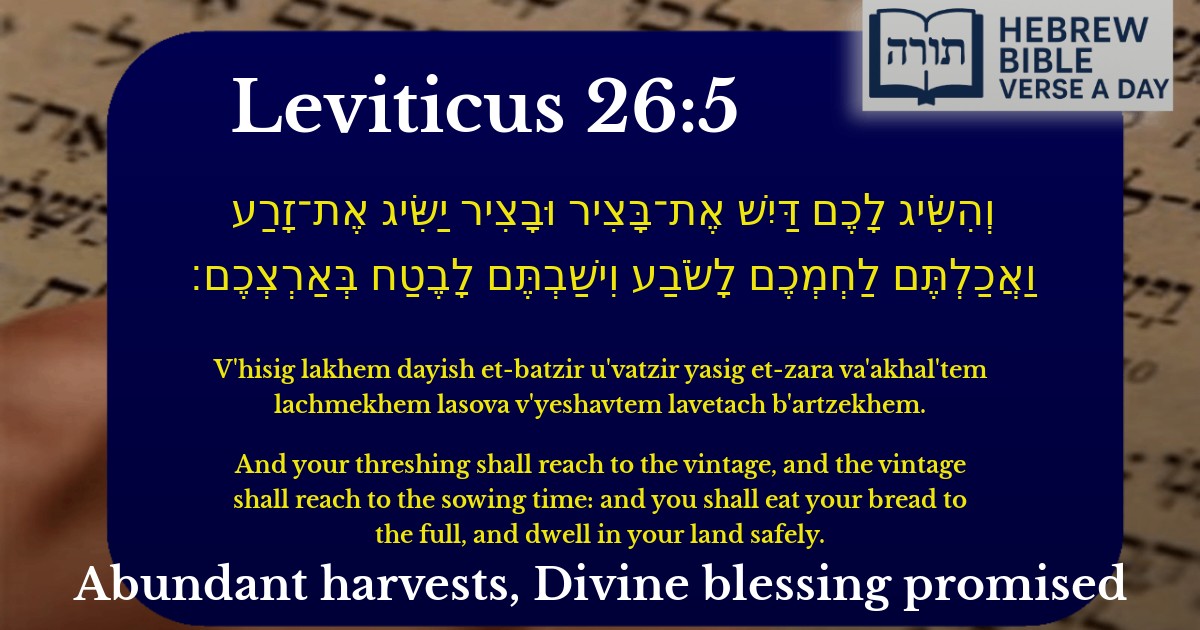Join Our Newsletter To Be Informed When New Videos Are Posted
Join the thousands of fellow Studends who rely on our videos to learn how to read the bible in Hebrew for free!
Hebrew Text
וְהִשִּׂיג לָכֶם דַּיִשׁ אֶת־בָּצִיר וּבָצִיר יַשִּׂיג אֶת־זָרַע וַאֲכַלְתֶּם לַחְמְכֶם לָשֹׂבַע וִישַׁבְתֶּם לָבֶטַח בְּאַרְצְכֶם׃
English Translation
And your threshing shall reach to the vintage, and the vintage shall reach to the sowing time: and you shall eat your bread to the full, and dwell in your land safely.
Transliteration
V'hisig lakhem dayish et-batzir u'vatzir yasig et-zara va'akhal'tem lachmekhem lasova v'yeshavtem lavetach b'artzekhem.
Hebrew Leining Text
וְהִשִּׂ֨יג לָכֶ֥ם דַּ֙יִשׁ֙ אֶת־בָּצִ֔יר וּבָצִ֖יר יַשִּׂ֣יג אֶת־זָ֑רַע וַאֲכַלְתֶּ֤ם לַחְמְכֶם֙ לָשֹׂ֔בַע וִֽישַׁבְתֶּ֥ם לָבֶ֖טַח בְּאַרְצְכֶֽם׃
וְהִשִּׂ֨יג לָכֶ֥ם דַּ֙יִשׁ֙ אֶת־בָּצִ֔יר וּבָצִ֖יר יַשִּׂ֣יג אֶת־זָ֑רַע וַאֲכַלְתֶּ֤ם לַחְמְכֶם֙ לָשֹׂ֔בַע וִֽישַׁבְתֶּ֥ם לָבֶ֖טַח בְּאַרְצְכֶֽם׃
🎵 Listen to leining
Parasha Commentary
📚 Talmud Citations
This verse is quoted in the Talmud.
📖 Ketubot 111b
The verse is cited in the context of discussing the blessings that will come to Israel when they observe the commandments, particularly the promise of agricultural abundance and security in the land.
📖 Sanhedrin 98a
The verse is referenced in a discussion about the future redemption and the messianic era, emphasizing the prosperity and peace that will characterize that time.


Overview of the Verse
The verse (Vayikra 26:5) describes the blessings of agricultural abundance and security that will accompany the Jewish people when they follow Hashem's commandments. It portrays an ideal state where the harvests are so plentiful that they overlap, ensuring sustenance and peace in the land.
Agricultural Blessings: Threshing, Vintage, and Sowing
Rashi explains that "your threshing shall reach to the vintage" means the grain harvest (threshing) will be so abundant that it will last until the grape harvest (vintage), and the grape harvest will be so plentiful that it will last until the next sowing season. This signifies uninterrupted prosperity, where one harvest seamlessly transitions into the next without scarcity.
Eating to Satisfaction and Dwelling Securely
The second half of the verse emphasizes two additional blessings:
Midrashic Insights
The Midrash (Toras Kohanim) connects this verse to the broader theme of divine reward for obedience. It teaches that such blessings are not merely material but reflect a harmonious relationship with Hashem, where nature itself aligns with the spiritual state of the people.
Halachic and Ethical Implications
The Talmud (Berachos 35b) derives from this verse that one must recite blessings before and after eating, recognizing that sustenance comes from Hashem. Additionally, the promise of security reinforces the principle that true peace is a divine gift earned through adherence to Torah values.